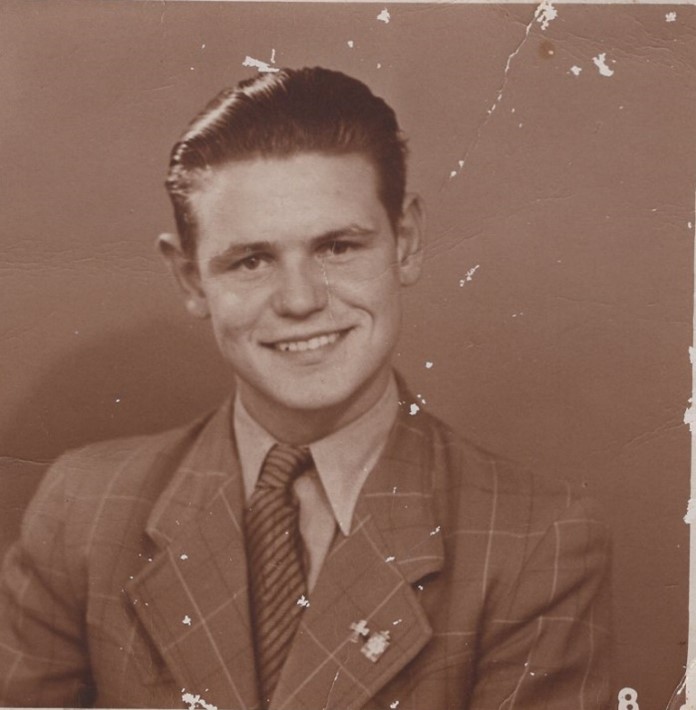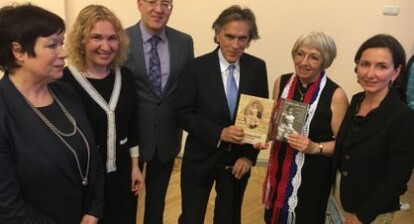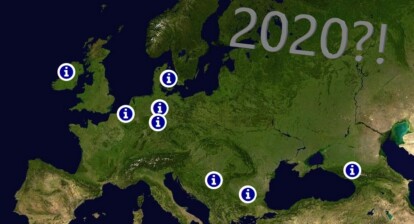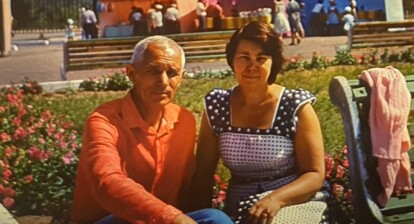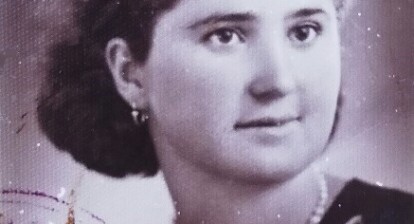How would you react if your world changed from one day to the other? Jakob from Denmark presents his grandfather’s memories from his youth under The German Occupation of Denmark during WWII which tell a story of a young and curious man living in a different kind of world.
Remembering Grandfather Arne: A Glimpse into the Past
My grandfather Arne and I used to sit and talk about lots of historical stuff whether it be our family tree, local history or how life was in the “old days”. He would tell me stories about how he lived with his family in the 1950’s and how things had changed. Sometimes we would talk about how it was during World War II and how life was in the 40’s. In April 1940 the 15-year-old Arne witnessed German troops enter Denmark, which later resulted in a five-year occupation. His thoughts and memories of the day the troops arrived are reflecting a young man who is experiencing a world changing around him.
Sadly, my grandfather passed away last October, but his memories remain written in his diaries and he used to give family members written stories in small self-made books about his early life and how he met my grandmother. But I still remember him telling the story of the occupation at the lunch table in his living room.
I feel like these memories show the world through the eyes of a young man, kind of like myself as well as many of my friends. A young man who is a part of a world in conflict and reacts to the changing of the world. Sometimes I think about how I would have reacted in his situation or how anyone I know would’ve. He was merely 15, meaning he was a young, spirited teenager filled with imagination and curiosity.
When I think of how teens today have to face different challenges, I often think about the changes the world has been through. How it reflects our understanding of the people around us, and how we deal with the things we face in life. The youth today – myself included – can only imagine how it was to live in a world, where suddenly all the rules are changed. Where you have to live a different life, from what you are used to. This is probably why I chose to focus on and tell the story of my grandfather as a young man. To see an enemy force occupying his home through his eyes, and his voice as a teenager.
A Teenager’s Witness: April 1940 and The German Occupation of Denmark
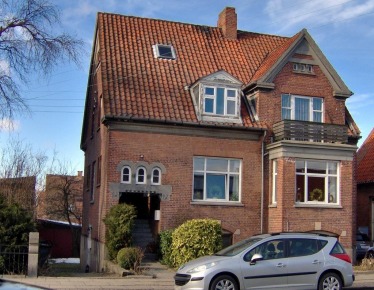
The house on Gaabensevej, where my grandfather lived on the day of the occupation (Modern Photo) (Photo: Private)
He recalls the morning of the 9th of April as following:
“I got little sleep that night as already by dawn I was awoken by engine noises and jumped to my small skylight. When I opened the window, I saw straight into the pilot’s cabin of a large transport-flight and next to it two more of the same kind flew by. They all had green paint on top as well as light blue at the bottom and on the sides of them, black angles formed a cross. On the tail wing there were clear Swastika, meaning no doubt these were German machines which followed the Guldborgsund north.
A Nation Awakens: German Troops in Gedser
In the living room my parents were already up and had turned on the radio, but it was dead silent. We suspected then, there had to be German troops on their way, and it didn’t last long before we knew it for a fact, as down by Gåbensevej we could spot troops on motorbikes in full army-equipment. Later, we saw camouflaged vehicles, so it was obvious, that German troops had landed in Gedser.
An Unsettling Presence
At about around 7 am, the motorized troops on the road were replaced by regular bikes in two rows driving north. At the roundabout a group of motorized troops were directing the traffic through town and around the school. There, the head-teacher told us about the situation, how we should keep calm and sent us all home.
A Quest for Understanding
Clearly marked by the situation we left the school; however, we couldn’t just keep calm. We had to know what was happening! Two of us followed the German columns on their way north. Nobody said anything to us, so we kept going. We wanted to see what had happened to Storstrømsbroen – our local pride – and if it still stood tall. Luckily, it did and without trouble we got across and followed the biking columns to the garrison in Vordingborg. Here the Danish flag – Dannebrog – was replaced with a swastika-flag. When we had driven around in town, we went on our way home.
When I read this part of my grandfather’s memories, I always find it funny and interesting. The way he showed a somewhat fascination for the situation. This is where, I think, youngsters both back then as well as today are alike. We are all curious about changes in life, and I sometimes see some of myself in the way my grandfather behaved.
Bridge to Uncertainty: Halted at Masnedø
He continues:
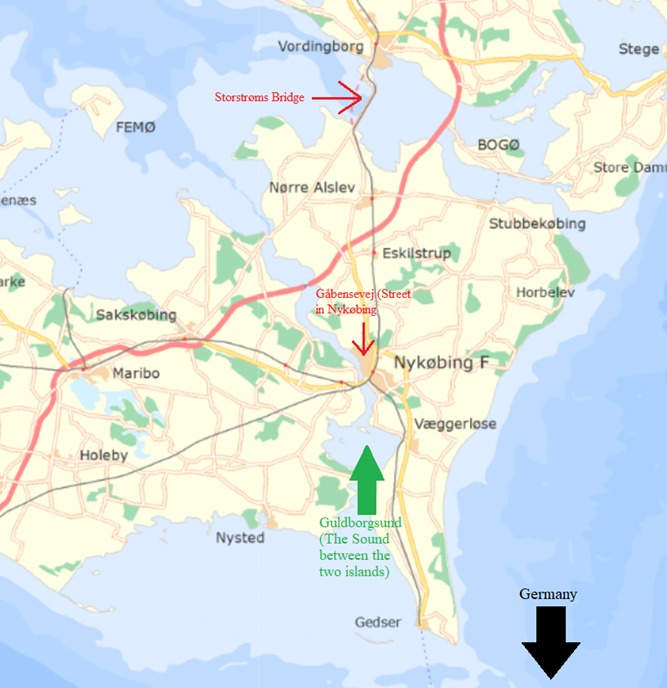
Map of the area around the island of Falster
However, we didn’t get any farther than Masnedø (A small island between my grandfathers’ home on Falster and Zealand). Here we could spot, that the bridge had been closed on the other side and German troops were guarding it. We hesitated a bit, but got closer to the guards, where one of them approached us and denied us to cross. Now we had to make use of our German-speaking skills, because we were led to a guy with angles on his shoulders. We had to explain to him, that we lived in Nykøbing (on the island of Falster) and we wanted to go home.
Securing Home: A City in Blackout
He accepted our explanation and made one of the troops follow us across the bridge. When we got home, we were met with the sight of people hurrying to secure their homes with darkening materials. Everyone made sure no lights were visible from their homes and even checked on their neighbours. (This was done during the war to secure the houses and the city against bombings by using blackout curtains and turning off all lights during the night and in the event of an air raid. To make sure everyone was safe, all houses should be blacked out.)
Radio Waves and Mixed Messages: A Nation’s Response
Later we listened to the radio in the living room where the speaker repeated the king’s as well as prime minister Stauning’s calls for peaceful and correct attitudes towards the foreign troops. Meanwhile, everyone was studying – while shaking their heads at – the info-notes, which had been passed around or dropped by the German troops. It said in a mix between Danish and Norwegian, that the leaders of England and France had declared war on Germany. Some of the words read: “Uten Grund og imot den tyske Regjerings og det tyske Folks oprigtige ønske om at leve i Fred og Venskab med det engelske og franske Folk. ” (Translated: Without reason and against the German government and the German people’s sincere wish to live in peace and friendship with the English and the French people.”)
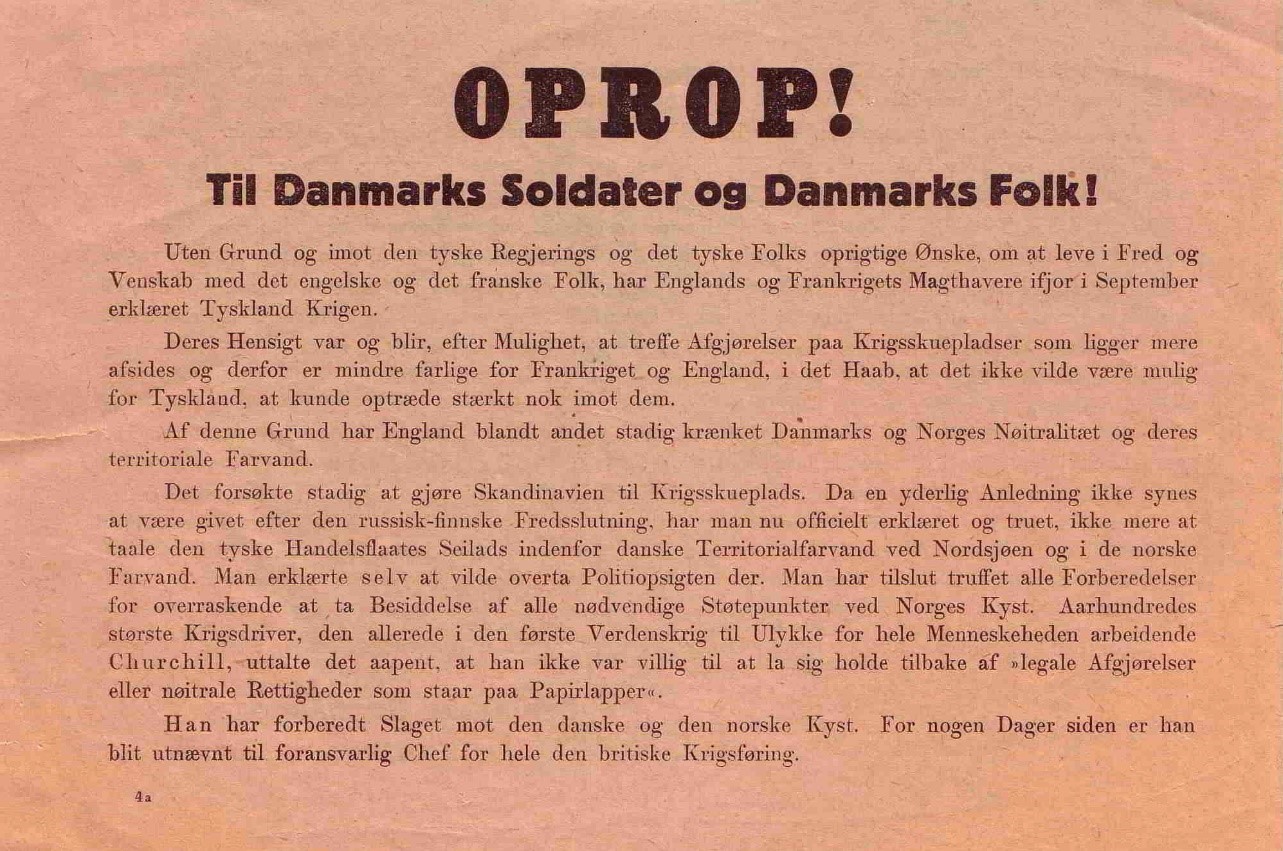
The note which the Germans dropped on the 9th of April (Photo: Private)
War Stories: Resistance and Consequences
Apart from the day of the occupation, my grandfather told me other stories about the the German Occupation of Denmark. At one time he had protested by tearing down a propagandic poster, which a German soldier saw, ran towards my grandfather and knocked him out. Most of the time my grandfather transported “illegal newspapers” around to the people, with the fear of being caught.
Student Life in Wartime
He was studying to be a teacher during the war and lived close to Copenhagen at the school. However, the German troops needed several bases around the country where they could station their soldiers. This school was emptied of students for the troops to be stationed there. All the students had to live in private accommodation around the city in basements and living rooms supported by the families living there.
A Close Call in Copenhagen
But I always think of one special story my grandfather told me from the end of the war. It was in 1945 on the 9th of April, about a month before Germany would capitulate, and my grandfather was living in Copenhagen at that time. Five years earlier, when the Germans had occupied the country, several Danish troops had died defending the country when they were attacked. In remembrance of these men as well as others who had sacrificed themselves or fought for Denmark, a large crowd of people gathered at the center of the city near the City Hall. It is a large area in front of the building with nearby roads.
On that day, many people were standing there and having a 2-minuts silence in remembrance. Suddenly several members of the HIPO Corps as well as a few German troops arrived and started to shoot at the gathered crowd. My grandfather was present in that crowd and had to flee the area. He ran down a side road and jumped behind a structure next to the City Hall where he could stay hidden from the bullets.
Haunted Memories: Reflections on Occupied Denmark
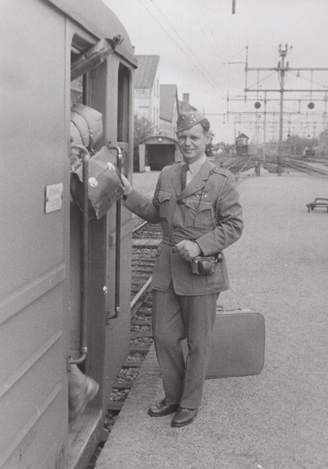
My Grandfather in uniform after the war (Photo: Private)
At my brother’s wedding a couple of years ago at the City Hall he showed me the place where he had been hiding at that time. The event has been filmed and the Corps arriving can be seen in one of the videos. This story always makes me think of the dangers, which lurked around during the occupation. German-friendly Danes would turn in people who fought against the occupation force, and people didn’t really know who to trust.
A World Transformed
What these stories from the day of the invasion as well as during the war show me, is my grandfather as a young man filled with curiosity as well as some fear of what would happen to his homeland. It shows my grandfather as a teen boy experiencing a completely different kind of everyday life than I and my fellow Danish youngsters are familiar with. I often ask myself, how I would have reacted in the same situation or how anyone of my friends would have. The thoughts that must have gone through everyone’s minds seeing the machines fly across the town and experiencing the whole nation change. My grandfather did indeed live in a different kind of world.

